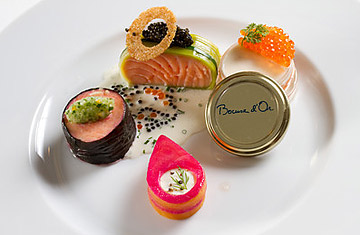
Bocuse d'Or Salmon
While the world's greatest athletes are currently competing at the Vancouver Winter Olympics, the world's greatest chefs are busy training for the premier cooking contest, the Bocuse d'Or, which will take place next January in Lyon, France. In the twelve competitions that have taken place since the first biennial Bocuse d'Or in 1987, America has never won, or even finished better than sixth. (France has won fully half of the contests to date.) Ten days ago, a young cook named James Kent, who helps run the kitchen in New York City's Eleven Madison Park restaurant, was anointed as this year's hope to break the jinx. Given the splendor of the food he produced in the qualifying contest, and the nanotech precision of his four-star kitchen — not to mention the months of training and coaching he'll receive — there's every reason to believe Kent will do better than the U.S.' best ever finish. The question, though, isn't whether we can win; the question is why we would even want to.
After all, the idea of a cooking contest is downright bizarre. Why not have a kissing contest? Or a baby-naming battle? The notion of taking something so subjective, personal and essentially un-competitive as cooking and making a Mortal Kombat-style tournament seems, at least on its surface, patently insane. (The original Japanese Iron Chef took this as a given, and presented the contests as the whim of a wealthy madman.) If you've ever participated in a cook-off, you know how meaningless the scoring is, how opaque and arbitrary the judges' standards are, how random and unpredictable the results.
And yet, if anything, cooking contests have become an inescapable part of our culture: Top Chef remains a ratings juggernaut, and The Food Network's Iron Chef likewise. Competition barbecue gets bigger every year. And even on the local level, every city is seeing more and more local cook-offs, from high-end ones like Cochon 555 that feature some of the best chefs in town, to pro-am affairs like the Cassoulet Contest or Meatball Slapdown, events I recently judged in New York.
Bocuse d'Or plays at a higher level, and brings fanatical nationalism into the mix, but it's the same essential spirit — Top Chef finalist Kevin Gillespie had a shot this year, and season 3 winner Hung Huynh two years ago. Gillespie pulled out because he didn't have time to prepare, but Hung almost won the qualifer two years ago. Still, Top Chef and its ilk are roundly mocked by actual top chefs (no matter how many appear on the show as guest judges.) So why would culinary demigods like Thomas Keller, Daniel Boulud and the great Paul Bocuse himself, who created this monstrosity, be so invested in what is basically just a bigger, more elaborate version of the show?
"It's true, it doesn't make any sense at all," says Andrew Friedman, a food writer whose compelling study of last year's contest, Knives at Dawn, came out in December. "It's a leap of faith. First you take the leap, then decide it's something worth doing and then you get obsessed."
And it doesn't take much for cooks to become obsessed with competition. The dining public already tends to think in sports terms anyway. Every city magazine has a "best of" issue whose every category is hotly debated. The stars the local paper gives out make or break restaurants by telling uncertain diners with limited money to spend where they can blow it with the minimum risk. Chefs like to say that they just want to feed people, or, more wussily still, "make my guests happy." But the truth is that they got into the business because they were creative and driven and wanted to do something special, and usually something more special than their peers. On the other hand, these wildly ornate, ultra-meticulous dishes are totally out of step with what diners seem to want now, which is simple food presented in a slightly elevated way.
But then winning contests like Bocuse d'Or aren't even really about cooking, in the strictest sense. They're about theater, about spectacle and the ability to produce towering showpieces like Kent's "Scottish salmon with osetra caviar and sauce Fumet Blanc garnished with roulade of salmon with king crab and meyer lemon relish, and chilled salmon mousse with salmon tartare and salmon roe" in the minimum time. "The people that win [Bocuse d'Or], their food is so over-the-top," says Kent. "The [Bocuse d'Or] dish needs to be a showstopper. It needs to make you go, whoa."
That "whoa," is what these contests are all about; and the showbiz impulse behind them drives big-name chefs, who all want to be the person that elicits that breathless gasp of wonderment. It's ego, yes, but it's also the urge of any artist. It's why we're not still eating beef wellington and clams casino. It's why food matters now in a way it didn't 20 years ago.
Bocuse d'Or is the gastronomic version of the Apollo program. There's no real reason to do it, the difficulties are nearly insoluble, and the cost in time and money is prohibitive. But to plant the flag on the alien surface of European haute cuisine! To beat the Frenchies at their own game! The chef that pulls that off will be a hero to his peers, and will make his career overnight.
And then he can get back to worrying about making the guests happy.
Josh Ozersky is a James Beard Award–winning food writer and the author of The Hamburger: A History. You can listen to his weekly show at the Heritage Radio Network and read his column on home cooking at Rachael Ray's website. He is currently at work on a biography of Colonel Sanders.
